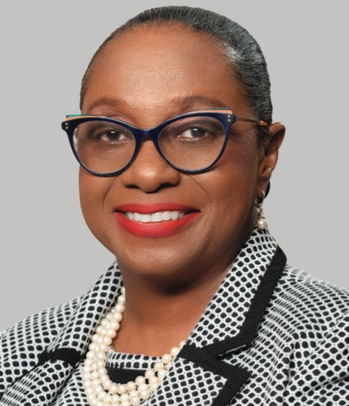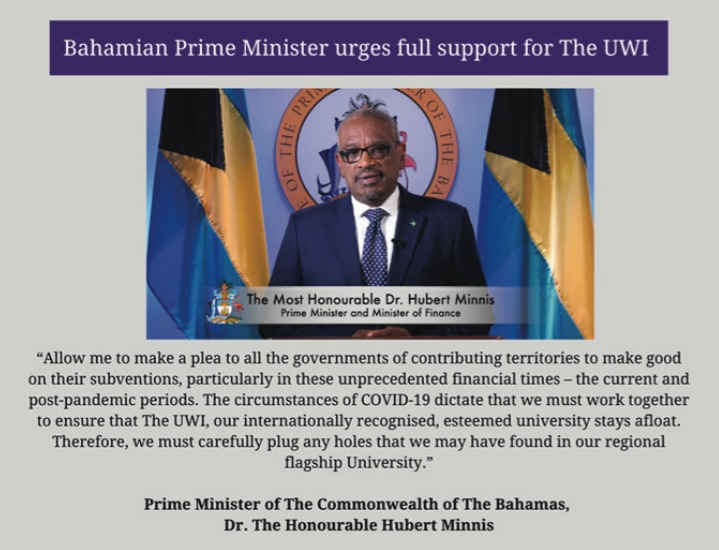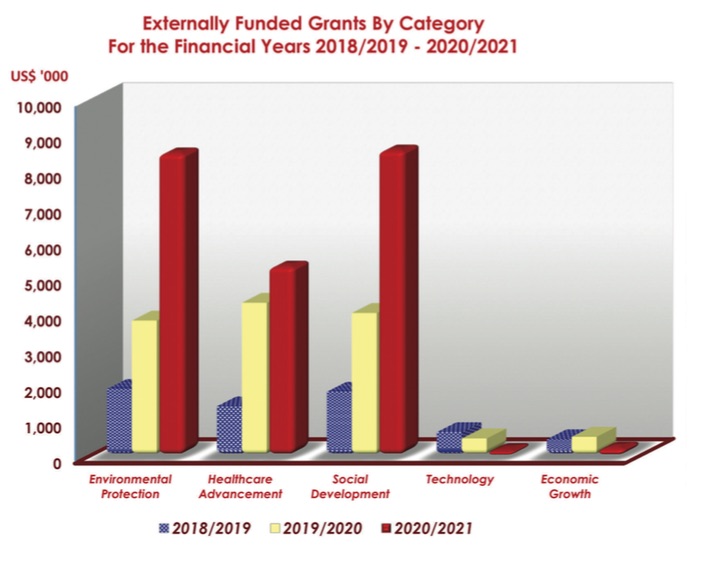
University Bursar/ Chief Financial Officer
Improving the financial health of The UWI is one of the objectives of “Agility”. During the academic year 2020/2021, the Office of Finance and the Campus Bursaries continued to effectively manage the financial affairs of The UWI to achieve this objective.
Globally, universities and college campuses have been impacted significantly by the rapid spread of the coronavirus (COVID-19) outbreak commencing in 2020, creating uncertainty regarding the implications for higher education. The UWI remained resilient in its efforts to remain viable, and by continuing to exercise fiscal prudence, was able to achieve this goal.
The most effective tool for student retention and maintaining access to learning has been delivery of online programmes. At the onset of the COVID-19 pandemic, The UWI had to pivot to remote learning for its students. This was not new to The UWI as the Open Campus had engaged in this modality for a long time. In a short time, the other campuses responded to the need to place their programmes online. In this digital age, The UWI is better placed today more than ever to provide students with easy access to continue their studies online and this is being further developed as an income generating initiative.
During the 2020/2021 academic year, The UWI continued to face funding challenges exacerbated by the onset of the COVID-19 pandemic during the previous academic year. Facing declining revenues this past academic year, The UWI took additional steps to control spending, while seeking additional revenues and adopting new policies to provide quality service to its stakeholders. The budget approved for the 2020/2021 academic year took into consideration the uncertainties created by the COVID-19 pandemic and, in addition to other measures taken, The UWI also curtailed spending on capital projects.
A summary of the financial performance of The UWI for the year ended July 31, 2021 is provided below. This represents the combined performance of the five campuses and certain of their subsidiaries as well as the University Centre.
The audited Financial Statements of The UWI for the financial year 2020/2021 show that the operations of The UWI resulted in a deficit of BDS$29.3 million, representing a 57% reduction in the deficit of BDS$68.3 million recorded in 2020, after finance costs, depreciation and post-employment pension and medical benefits expense. Prior to inclusion of these items of expenditure the operations showed a surplus of BDS$67.8 million (2020: BDS$32.7 million). The improved results were primarily due to reduction in expenditure.
Other comprehensive income was BDS$103.8 million (2020: BDS$23.4 million) comprising primarily of a gain of BDS$80.8 million from the actuarial re-measurement of the post-employment pension and medical benefits liability . Contributing factors were the increase in the discount rates used to measure the liability as well as a significant reduction in actual premium rates for medical insurance, compared to that previously expected. Total Comprehensive income for the year therefore stood at BDS$74.5 million (2020: BDS$44.9 million loss).
Total income for 2021 was BDS$847.8 million, a reduction of 6.3% from BDS$905.2 million in 2020. The sources of income for the year were: Government Contributions 46% (2020: 47%), Tuition and Other Student Fees 16% (2020: 15%), Special Projects and Other projects 21% (2020: 20%), Commercial Operations 12% (2020: 13%) and Other Income 5% (2020: 5%).
For the year ended July 31, 2021, Government contributions, the most significant source of income, totalled BDS$391.9 million, a reduction of 8.1% from BDS$426.6 million in 2020.
This was primarily due to reduced commitments from some Governments as they tried to respond to the needs of their own health care systems in the COVID-19 pandemic.
Income from tuition and other student fees for UGC funded programmes totalled BDS$137.5 million in 2021, and showed a marginal increase over BDS$137 million in 2020. Some campuses experienced a decline in enrolment, while at other campuses enrolment was marginally increased or remained flat for the academic year 2020/2021.Tuition fees remained unchanged at the 2020 levels at all campuses.

Income from commercial operations showed a decline as halls of residence and other income generating ventures ceased or curtailed operations during the COVID-19 pandemic. The total of other sources of income including fees from self-financing programmes showed a decline of 2% from that reported in 2020.
Total expenditure for 2021 was BDS$877.1 million, a reduction of 9.9% from BDS$973.5 million in 2020. The categories of expenditure and their percentages of the total were: Departmental 47% (2020: 45%), Administrative 13% (2020: 12%), Central 15% (2020: 16%), Special and Other projects 17% (2020: 19%) and Commercial Operations 8% (2020: 8%).
The two items of expenditure which continue to be drivers of the deficit shown in the financial statements of The UWI from time to time are: (i) post- employment pension and medical benefits expense and (ii) impairments. Actuarial valuations, conducted by an independent Actuary and in accordance with International Accounting Standard 19 (IAS19), determined that for 2021 the cost of post-employment benefits (pension supplementation and medical benefits) for all campuses and the University Centre, and the costs associated with the defined benefit scheme for administrative staff at the St Augustine Campus, totalled BDS$45.2 million (2020: BDS$43.2 million). The pension supplementation element of the Federated Superannuation Scheme for Universities (FSSU) is unfunded.
Impairments recorded in accordance with International Financial Reporting Standard 9 (IFRS9) accounted for BDS$16.3 million of the deficit in 2021 (2020: BDS$22.7 million). Impairments were recorded primarily on student and Government receivables outstanding for several years.
These two items of expenditure which continue to influence the results adversely each year, are being reviewed by a Special Committee of the University Grants Committee (UGC) formed in 2020. The Committee is chaired by The Honourable Mia Amor Mottley, Prime Minister and Minister of Finance, Economic Affairs and Investment, Barbados and is comprised of Government representatives, members of the Private Sector and the University leadership team. The inaugural meeting of the Committee was held on March 17, 2021.
A preliminary Report of the Committee on measures to reduce the cost of post-employment pension and medical benefits and the associated liability was presented to UGC on April 6, 2022 by Mr Dodridge Miller, President and Chief Executive Officer of Sagicor Financial Company Limited.
A Consulting Actuary was also previously engaged to review the post-employment benefit schemes and a Report was received with recommendations which are being examined for implementation.
Both reports indicated that substantial benefits could be achieved in improving the financial results of The UWI, from implementation of the measures recommended.
The UWI maintained a positive working capital position, although a reduction of 5.6% was seen in 2021 when compared to 2020. Current assets decreased by 2.9% while current liabilities showed a 1.3% reduction. Some entities of The UWI continued to experience cash flow shortages primarily from the inability to collect receivables on a timely basis.
Total reserves of the University showed an increase of 23%, from BDS$255.9 million in 2020 to BDS$314.9 million in 2021.
Government receivables and student receivables accounted for the majority of the receivables at July 31, 2021.
Higher Education delivers real and substantial benefits to economies globally. This investment in human capital provides individuals with the ability to gain mobility up the economic ladder. Over the years, Caribbean Governments have relied on The UWI as the institution of choice to educate their people. This ultimately helps to address the needs of the Caribbean economies and bolsters economic growth. The development of the region has benefited significantly from Governments’ investment in education.
During the year 2020/2021, emphasis was placed on maintaining dialogue with contributing Governments to encourage payments of their committed and assessed contributions for economic cost to The UWI on a consistent basis. The UWI continued to maintain invaluable relationships with contributing Governments and increased their awareness regarding their outstanding obligations to the institution. In an effort to recover outstanding debt, The UWI continued to submit payment plans accompanied by monthly or quarterly invoices and statements to the contributing Governments. This has assisted somewhat in reducing the receivables of most Governments. The total net receivable of Government contributions for economic cost at July 31, 2021 was BDS$102.7 million, an increase of 6% above BDS$96.8 million (net) at July 31, 2020. Other amounts receivable from Governments for tuition fees and other items were progressively received throughout the year, but at the year-end there were balances that were not settled. Dialogue has continued with Governments regarding recovery of the amounts outstanding.
Student receivables at July 31, 2021 stood at BDS$103.6 million, an increase of 11% over BDS$93.5 million at July 31, 2020. This primarily resulted from the inability to collect student fees on a timely basis primarily due to the hardships faced by students as a result of the adverse effects of the COVID-19 pandemic.
Annually, the Office of Finance issues Budget Guidelines to the campuses and University Centre departments for the preparation of the Biennial Estimates, and co- ordinates and directs the preparation of these estimates for submission to the Meetings of the Technical Advisory Committees (TACs) and the Grants Committees.
The TACs met virtually on March 2 and 3, 2021 to deliberate on the budgets of The UWI and the University Hospital of the West Indies (UHWI) for the Biennium 2021/2022 - 2022/2023. The Opening Ceremony was hosted virtually by the Government of The Bahamas.
The Campus Grants Committees (CGCs) and the University Grants Committee (UGC) subsequently met virtually on April 7, 2021 and reviewed and approved the Biennial Estimates for 2021/2022 and 2022/2023 of The UWI and The UHWI, based on the recommendations of the TACs. The decisions taken on other financial matters by the Sub-Committees and Special Committees of UGC were also ratified by UGC.
Both the TACs and Grants Committees had representatives from the Ministries in the contributing countries responsible for tertiary education and finance. The Ministry of Health, Jamaica was also represented. Representatives of The UWI and UHWI also attended the meetings.
The UGC meeting was chaired by the Honourable Colm Imbert, Minister of Finance, Trinidad and Tobago. An expenditure budget of BDS$652.8 million was approved for The UWI, to be funded by Government contributions totalling BDS$492.2 million, tuition fees of BDS$131.9 million and the balance from other sources of income.
An expenditure budget of XCD49.7 million was approved for the Five Islands Campus. The budget included XCD25.2 million for the infrastructural and information and communication technology development of the Campus. The budget of the Five Islands Campus was expected to be funded in the amount of XCD47.3 million, by Government contributions from the Government of Antigua and Barbuda, the only contributing Government to this Campus. Tuition fees and other income were expected to provide the balance.
The total value of Research Grants received for the 2020/2021 financial year totalled US$22.7 million (2019/2020: US$13.1 million). The total reflects a 73% increase over the prior year. This significant improvement is primarily attributed to increased research activity in healthcare advancement, social development and environmental protection. This is graphically represented below.

To sustain this trend, The UWI continues to enhance processes and provide training in the preparation of proposals suitable for award acceptance, account management and project closeout that together provide better service to the departments, research administrators, principal investigators and donors. The UWI is aiming to maximise income from fees earned from execution of sponsored research projects as part of its income generation drive.
To widen access to students to receive a university education as well as to retain students, there were no increases in tuition fees for the academic year 2020/2021. This was due to the need to continue to keep fees affordable to students, in light of the adverse effects that the COVID-19 pandemic had on families.
During the 2020/2021 academic year, scholarships to UWI students were provided from funds raised through The UWI Regional Endowment Fund, The British Foundation and The American Foundation of The UWI, The UWI Toronto Benefit Gala and gifts from individuals and the private sector. Awarding of scholarships from these sources was managed by the Institutional Advancement Division.
From its UGC budget, The UWI also offered Open Scholarships to undergraduate students. Postgraduate students were also provided with scholarships and grants for research and publications.
A Special Committee of UGC was formed in 2020 to review and make recommendations on the structure and operations of the University Centre.
The Committee is chaired by Dr. the Right Honourable Keith C. Mitchell, Prime Minister and Minister of National Security, Public Administration, Youth Development, Home Affairs, ICT and Disaster Management, Grenada, and consists of membership from the contributing Governments and the Private Sector. The inaugural meeting was held on Thursday, May 6, 2021 and a preliminary Report was tabled at the UGC meeting on April 6, 2022. The operations of the Open Campus are also being reviewed by The UWI’s leadership team to determine strategies to maintain its viability.
This is a University-wide project which is expected to yield efficiencies in several areas of the operations of the institution. The project has three tracks: academic, technology and business. The Digital Transformation Initiative will include an ICT Target Operating Model for shared services. The Office of Finance and Campus Bursaries will be engaged in the implementation of various initiatives for shared services, which will provide significant reduction in the cost of operations. The current phase of the programme focuses on expanding online delivery of academic programmes to accommodate the strategic enrolment target and enhancing the infrastructure required for Business Continuity and Resilience. Subsequent to the financial year-end July 31, 2021, the Caribbean Development Bank (CDB) approved financing for the digital transformation project, with a loan of US$6 million and a grant of US$190,000 to The UWI. The loan is guaranteed by Sagicor Financial Company Limited and the Governments of Antigua and Barbuda and Barbados. The Governments of Jamaica and Dominica also facilitated lower interest rates for a portion of the loan, by transferring a portion of their allocation of the Special Funds Resources (SFR) at CDB to The UWI.
Staff members University-wide are tasked with ensuring that the Banner Finance system is optimally used.
The use of the Banner Finance System and its interfacing with other Banner Modules, particularly the Student Administration System and the Research Accounting and Grants Management module allowed The UWI to continue to improve efficiency in the accounting operations and generated timely and accurate financial information to support major initiatives across The UWI.
The UWI’s expenditure reduced in 2021 by 9.9% from the prior year, 2020. This level of reduction was an improvement over the prior year in which expenditure reduced by 4% from the 2019 levels.
In light of the budget cuts experienced, a number of cost saving measures have been undertaken across the campuses and the University Centre to reduce expenditure, while enhancing the delivery of service. Rationalisation of programme offerings and the reduction of staff costs, capital expenditure, travel, office expenditure and utilities, as well as leveraging technology are some of the strategic measures undertaken. Costs related to post-employment benefits are being reviewed for more cost- effective arrangements to be implemented.
The reduction in staff costs was achieved by reduction in numbers aided by attrition, freezing vacant posts and reassigning tasks and a reduction in overtime payments. Travel expenditure was cut by using various meeting platforms to host meetings virtually. The UWI continues to seek opportunities for operational efficiency in order to reduce cost.
The University operates defined-contribution pension schemes for its academic and senior administrative staff and non-academic staff. The St. Augustine Campus administers a defined-benefit plan for its administrative and technical staff.
The Federated Superannuation Scheme for Universities (FSSU) for academic and senior administrative staff has a defined benefit element, which provides qualifying retirees employed prior to August 1, 2005 with a supplement to pension on retirement. During the financial year, the Office of Finance continued to have consultations with an investment advisor on the maximisation of returns (at minimal risk) on investment of pension contributions of members of the FSSU. This is one of the tools that can be used to reduce the size of the unfunded supplementation liability. Sound management of all pension schemes was continued in 2020/2021.
The UWI appreciates the financial support received from contributing Governments, funding agencies (particularly donors to research projects), the private sector, alumni, staff, students and other stakeholders without whom it could not achieve its current commendable Times Higher Education ranking as being among the top 1.5% of universities in the world.
Astute stewardship of The UWI’s resources and improving the financial health of The UWI remains a priority. The UWI will continue to focus on revenue generation and cost containment in order to improve its financial health while achieving the other objectives of its Strategic Plan.
As we continue to adjust to an unpredictable situation with the COVID-19 pandemic, strong financial stewardship will position The UWI to accelerate progress.